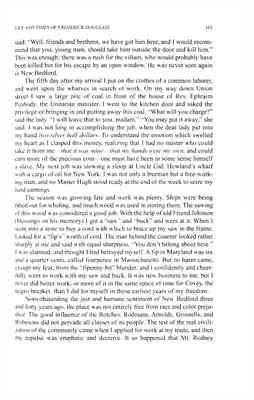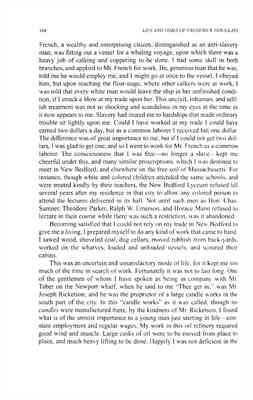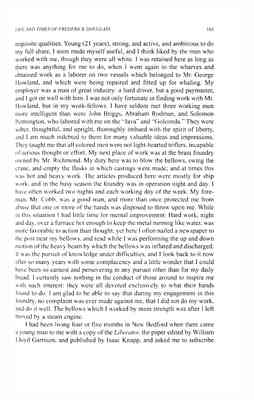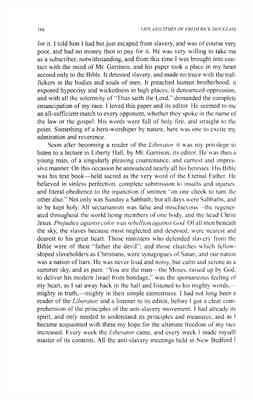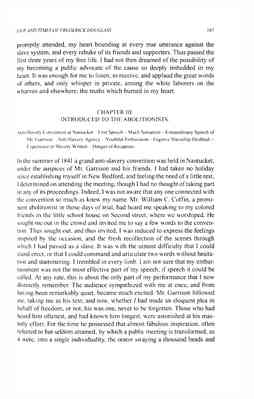Pages
11
LIFE AND TIMES OF FREDERICK DOUGLASS 163
said: "Well, friends and brethren, we have got him here, and I would recommend that you, young men, should take him outside the door and kill him." This was enough; there was a rush for the villain, who would probably have been killed but for his escape by an open window. He was never seen again in New Bedford.
The fifth day after my arrival I put on the clothes of a common laborer, and went upon the wharves in search of work. On my way down Union street I saw a large pile of coal in front of the house of Rev. Ephraim Peabody, the Unitarian minister. I went to the kitchen door and asked the privilege of bringing in and putting away this coal. "What will you charge?" said the lady. "l will leave that to you, madam." "You may put it away," she said. I was not long in accomplishing the job, when the dear lady put into my hand two silver half dollars. To understand the emotion which swelled my heart as I clasped this money, realizing that I had no master who could take it from me—that it was mine—that my hands were my own, and could earn more of the precious coin—one must have been in some sense himself a slave. My next job was stowing a sloop at Uncle Gid, Howland's wharf with a cargo of oil for New York. I was not only a freeman but a free-working man, and no Master Hugh stood ready at the end of the week to seize my hard earnings.
The season was growing late and work was plenty. Ships were being fitted out for whaling, and much wood was used in storing them. The sawing of this wood was considered a good job. With the help of old Friend Johnson (blessings on his memory) I got a "saw" and "buck" and went at it. When I went into a store to buy a cord with which to brace up my saw in the frame, I asked for a "fip's" worth of cord. The man behind the counter looked rather sharply at me and said with equal sharpness. "You don't belong about here." I was alarmed, and thought I had betrayed myself. A fip in Maryland was six and a quarter cents, called fourpence in Massachusetts. But no harm came, except my fear, from the "fipenny-bit'' blunder, and I confidently and cheerfully went to work with my saw and buck. It was new business to me, but I never did better work, or more of it in the same space of time for Covey, the negro-breaker, than I did for myself in these earliest years of my freedom.
Notwithstanding the just and humane sentiment of New Bedford three and forty years ago, the place was not entirely free from race and color prejudice. The good influence of the Rotches, Rodmans, Arnolds, Grinnells, and Robesons did not pervade all classes of its people. The test of the real civilization of the community came when I applied for work at my trade, and then my repulse was emphatic and decisive. It so happened that Mr. Rodney
12
164 LIFE AND TIMES OF FREDERICK DOUGLASS
French, a wealthy and enterprising citizen, distinguished as an anti-slavery man, was fitting out a vessel for a whaling voyage, upon which there was a heavy job of calking and coppering to be done. I had some skill in both branches, and applied to Mr. French for work. He, generous man that he was, told me he would employ me, and I might go at once to the vessel. I obeyed him, but upon reaching the float-stage, where other calkers were at work, I was told that every white man would leave the ship in her unfinished condition, if I struck a blow at my trade upon her. This uncivil, inhuman, and selfish treatment was not so shocking and scandalous in my eyes at the time as it now appears to me. Slavery had inured me to hardships that made ordinary trouble sit lightly upon me. Could I have worked at my trade I could have earned two dollars a day, but as a common laborer I received but one dollar. The difference was of great importance to me, but if I could not get two dollars, I was glad to get one; and so I went to work for Mr. French as a common laborer. The consciousness that I was free—no longer a slave kept me cheerful under this, and many similar proscriptions, which I was destined to meet in New Bedford, and elsewhere on the free soil of Massachusetts. For instance, though white and colored children attended the same schools, and were treated kindly by their teachers, the New Bedford Lyceum refused till several years after my residence in that city to allow any colored person to attend the lectures delivered in its hall. Not until such men as Hon. Chas. Sumner, Theodore Parker, Ralph W. Emerson, and Horace Mann refused to lecture in their course while there was such a restriction, was it abandoned.
Becoming satisfied that I could not rely on my trade in New Bedford to give me a living, I prepared myself to do any kind of work that came to hand. I sawed wood, shoveled coal, dug cellars, moved rubbish from back-yards. worked on the wharves, loaded and unloaded vessels, and scoured their cabins.
This was an uncertain and unsatisfactory mode of life, for it kept me too much of the time in search of work. Fortunately it was not to last long. One of the gentlemen of whom I have spoken as being in company with Mr. Taber on the Newport wharf, when he said to me "Thee get in," was Mr. Joseph Ricketson; and he was the proprietor of a large candle works in the south part of the city. In this "candle works" as it was called, though no candles were manufactured there, by the kindness of Mr. Ricketson, I found what is of the utmost importance to a young man just starting in life—constant employment and regular wages. My work in this oil refinery required good wind and muscle. Large casks of oil were to be moved from place to place, and much heavy lifting to be done. Happily I was not deficient in the
13
LIFE AND TIMES OF FREDERICK DOUGLASS 165
requisite qualities. Young (21 years), strong, and active, and ambitious to do my full share, I soon made myself useful, and I think liked by the men who worked with me, though they were all white. I was retained here as long as there was anything for me to do, when I went again to the wharves and obtained work as a laborer on two vessels which belonged to Mr. George Howland, and which were being repaired and titted up for whaling. My employer was a man of great industry; a hard driver, but a good paymaster, and I got on well with him. I was not only fortunate in finding work with Mr. Howland, but in my work-fellows. I have seldom met three working men more intelligent than were John Briggs, Abraham Rodman, and Solomon Pennington, who labored with me on the "Java" and "Golconda." They were sober, thoughtful, and upright, thoroughly imbued with the spirit of liberty, and I am much indebted to them for many valuable ideas and impressions. They taught me that all colored men were not light-hearted triflers, incapable of serious thought or effort. My next place of work was at the brass foundry owned by Mr. Richmond. My duty here was to blow the bellows, swing the crane, and empty the flasks in which castings were made; and at times this was hot and heavy work. The articles produced here were mostly for ship work, and in the busy season the foundry was in operation night and day. I have often worked two nights and each working day of the week. My foreman, Mr. Cobb, was a good man, and more than once protected me from abuse that one or more of the hands was disposed to throw upon me. While in this situation I had little time for mental improvement. Hard work, night and day, over a furnace hot enough to keep the metal running like water, was more favorable to action than thought; yet here I often nailed a newspaper to the post near my bellows, and read while I was performing the up and down motion of the heavy beam by which the bellows was inflated and discharged. It was the pursuit of knowledge under difficulties, and I look back to it now after so many years with some complacency and a little wonder that I could have been so earnest and persevering in any pursuit other than for my daily bread. I certainly saw nothing in the conduct of those around to inspire me with such interest; they were all devoted exclusively to what their hands found to do. I am glad to be able to say that during my engagement in this foundry, no complaint was ever made against me, that I did not do my work, and do it well. The bellows which I worked by main strength was after I left moved by a steam engine.
I had been living four or five months in New Bedford when there came a young man to me with a copy of the Liberator, the paper edited by William Lloyd Garrison, and published by Isaac Knapp, and asked me to subscribe
14
166 LIFE AND TIMES OF FREDERICK DOUGLASS
for it. I told him I had but just escaped from slavery, and was of course very poor, and had no money then to pay for it. He was very willing to take me as a subscriber, notwithstanding, and from this time I was brought into contact with the mind of Mr. Garrison, and his paper took a place in my heart second only to the Bible. It detested slavery, and made no truce with the traffickers in the bodies and souls of men. It preached human brotherhood; it exposed hypocrisy and wickedness in high places; it denounced oppression, and with all the solemnity of "Thus saith the Lord," demanded the complete emancipation of my race. I loved this paper and its editor. He seemed to me an all-sufficient match to every opponent, whether they spoke in the name of the law or the gospel. His words were full of holy fire, and straight to the point. Something of a hero-worshiper by nature, here was one to excite my admiration and reverence.
Soon after becoming a reader of the Liberator it was my privilege to listen to a lecture in Liberty Hall, by Mr. Garrison, its editor. He was then a young man, of a singularly pleasing countenance, and earnest and impressive manner. On this occasion he announced nearly all his heresies. His Bible was his text book—held sacred as the very word of the Eternal Father. He believed in sinless perfection, complete submission to insults and injuries, and literal obedience to the injunction if smitten "on one cheek to turn the other also." Not only was Sunday a Sabbath, but all days were Sabbaths, and to be kept holy. All sectarianism was false and mischievious—the regenerated throughout the world being members of one body, and the head Christ Jesus. Prejudice against color was rebellion against God. Of all men beneath the sky, the slaves because most neglected and despised, were nearest and dearest to his great heart. Those ministers who defended slavery from the Bible were of their "father the devil"; and those churches which fellowshiped slaveholders as Christians, were synagogues of Satan, and our nation was a nation of liars. He was never loud and noisy, but calm and serene as a summer sky, and as pure. "You are the man—the Moses, raised up by God, to deliver his modem Israel from bondage," was the spontaneous feeling of my heart, as I sat away back in the hall and listened to his mighty words,— mighty in truth,—mighty in their simple earnestness. I had not long been a reader of the Liberator, and a listener to its editor, before I got a clear comprehension of the principles of the anti-slavery movement. I had already its spirit, and only needed to understand its principles and measures, and as I became acquainted with these my hope for the ultimate freedom of my race increased. Every week the Liberator came, and every week I made myself master of its contents. All the anti-slavery meetings held in New Bedford I
15
LIFE AND TIMES OF FREDERICK DOUGLASS 167
promptly attended, my heart bounding at every true utterance against the slave system, and every rebuke of its friends and supporters. Thus passed the first three years of my free life. I had not then dreamed of the possibility of my becoming a public advocate of the cause so deeply imbedded in my heart. It was enough for me to listen, to receive, and applaud the great words of others, and only whisper in private, among the white laborers on the wharves and elsewhere, the truths which burned in my heart.
CHAPTER III. INTRODUCED TO THE ABOLITIONISTS.
Anit-Slavery Convention at Nantucket—First Speech—Much Sensation—Extraordinary Speech of Mr. Garrison—Anti-Slavery Agency—Youthful Enthusiasm—Fugitive Slaveship Doubted— Experience in Slavery Written—Danger of Recapture
In the summer of 1841 a grand anti-slavery convention was held in Nantucket, under the auspices of Mr. Garrison and his friends. I had taken no holiday since establishing myself in New Bedford, and feeling the need of a little rest, I determined on attending the meeting, though I had no thought of taking part in any of its proceedings. Indeed, I was not aware that any one connected with the convention so much as knew my name. Mr. William C. Coffin, a prominent abolitionist in those days of trial, had heard me speaking to my colored friends in the little school house on Second street, where we worshiped. He sought me out in the crowd and invited me to say a few words to the convention. Thus sought out, and thus invited, I was induced to express the feelings inspired by the occasion, and the fresh recollection of the scenes through which I had passed as a slave. It was with the utmost difficulty that I could stand erect, or that I could command and articulate two words without hesitation and stammering. I trembled in every limb. I am not sure that my embarrassment was not the most effective part of my speech, if speech it could be called. At any rate, this is about the only part of my performance that I now distinctly remember. The audience sympathized with me at once, and from having been remarkably quiet, became much excited, Mr. Garrison followed me, taking me as his text, and now, whether I had made an eloquent plea in behalf of freedom, or not, his was one, never to be forgotten. Those who had heard him oftenest, and had known him longest were astonished at his masterly effort. For the time he possessed that almost fabulous inspiration, often referred to but seldom attained, by which a public meeting is transformed, as it were, into a single individuality, the orator swaying a thousand heads and
